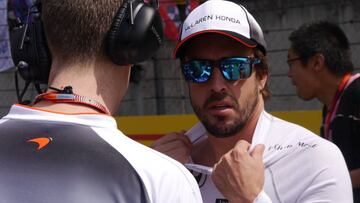Fernando Alonso interview on what's it like to lose and the state of Formula 1 today
The Spanish F1 driver gave his first interview of the year to AS, and talked about not winning and the current state of the sport</br><a title="Super Bowl 2018 live online: Patriots vs Eagles" href="https://en.as.com/en/2018/02/04/other_sports/1517784278_627836.html">Super Bowl 2018 live online: Patriots vs Eagles</a>

How are you? All good?
Fine, fine, it hurts a bit when I drive, but it's not too bad.
Beyond broken ribs and miraculous escapes, everything else...
Everything's good, I'm getting along...
Formula 1, although it doesn't seem like it, has changed a lot over the last few years and the drivers say for the worse because among other things the driver isn't as important. You can argue one way or the other whether you're the fastest but you always drive to the limit and that has made the difference in the past. How can you make that difference with the current cars?
It's definitely harder now because, like you said, it's difficult to feel various things with the way F1 is at the moment. You don't have to go as fast as you can all the time because later in the race you pay a price: everything heats up, the tyres don't respond well, you burn petrol...
So you're saying that sometimes the slowest driver, or the most intelligent, reaps the rewards...
Yeah, sometimes driving more relaxed or a little bit slower has its benefits between pit stops given that your time over the whole race ends up being faster. It is a little bit difficult, but it's a challenge and as a driver you try to keep improving and learning from everything, especially from the engine and your team. Today, overtaking in a Formula 1 race is different to how it was 10 years ago.
Do you still enjoy it?
In truth it's the same for everybody so as long as there is a competition with a level playing field I'll continue to enjoy the challenge of getting the best out of the car.
Is there a way of gaining an advantage over the rest of the grid if you find that key to the car?
Yeah, in a different way. As I said it's not just a case of pure driving these days. We have to manage the car, go quickly enough to have the same grip on the next curve, try to do 16 laps, 20 laps or 75 laps to the same 10th of a second. That's the challenge. It's less exciting but we arrive at the tracks to prepare for the weekend in a different way, working with the team to get the best results, so I still enjoy it and I still find driving in a Grand Prix exciting.
Not many people would say that Alonso is still learning...
You try to learn and to do something different compared to other drivers or in relation to your teammate because he is the only driver I have as a reference point. You try to do different things, take care of the tyres and spare the battery and the petrol. There are always different techniques for all of us and you have to try and be a bit efficient than everybody else.
But that isn't Formula 1, it's something else.
Well, it's still a challenge, trying to complete a quicker lap every time, make better pit stops... there are a lot of difficult moments where you try to call on all your experience to gain a few places.
It's odd how the real protagonists, those who risk their lives on the track, hardly have any power within the FOM and the FIA...
I think that's how it was in the past and now it's only a tradition that remains in Formula 1. Now we have the GPDA and all of the drivers are united in the idea that we want to change things because the decisions taken last year in F1 were opposed to what we believe should be in the interest of this sport. As such, hopefully the situation will change but, why did it have to come to this point? The FOM and the FIA do everything, normally they do it well and they will continue to do so, but there are some things that could be improved or that the drivers can be asked to assess.
It sounds like [the organizing bodies] don't like the drivers saying what they want to do.
We don't want to write the rulebook, we're not able to do that. But if they want to change the rules and they asked our opinion maybe we'd say to them: “Perfect,” or on the other hand, “that's not the way it should be,” and offer an explanation.
I always ask what victory means to you but now you're also familiar with defeat. What's it like to lose? How do you take it on board?
Well, I don't think it's changed that much. Obviously I want to win and I prepare for race weekends as though I'm fighting for victory. And then later you realize it's not possible, but I don't want to believe it's not possible until the last minute. But things haven't changed that much because I'm not winning.
Sometimes it seems as though the figure of Fernando Alonso is above victory or defeat in Formula 1...
In reality, after my time at Ferrari, I get more respect in the paddock and in Formula 1 than ever before. I've won two championships and I was world champion but I had a long career in me and when I won those titles it has to be said the Renault was very good in my first year compared to the McLaren in terms of reliability. In the second, the Michelins were superior to the Bridgestone. People always talk about the reasons behind those two titles but I've been in F1 for 16 years now and there are fewer discussions now. People respect me a lot more now thanks to so many races and performances week in and week out. Sometimes you win, sometimes you don't.
And are you still happy despite not winning?
I haven't won yet but I'm very happy with my life at the moment and the respect everybody shows me.
Many people consider you one of the best of all time, but can you be one of the best in history if you don't win a third title?
No, I don't think so. Villeneuve is one of the greatest Ferrari drivers of all time... but for the media it's important to win titles, it's the same philosphy as in football. Winning titles... but that's another thing.
No. sorry, I don't care about the media, I'm asking you, I already know what the press says. I want to know what Fernando Alonso thinks about the subject.
The philosophy of the media is that. I'll say it again: winning titles. But a sportsman who has acknowledgement and the respect of everybody also thinks about other things. To win more or less in this sport is a case of being in the car at just the right time. When people talk about you and respect you, even when you're in the wrong car at the wrong moment, when you have that respect it's more important than winning a title. That respect, that standing, means more than titles. Of course I'd like to have a few more trophies at home, but that's the way it is and I wouldn't change a single day of my career in Formula 1. I'm very happy.
Do you think you've made mistakes, shall we say diplomatic, in your career?
No. I'm sure that with hindsight it's always easy to find better ways to to do things or to change certain decisions, but if you change something in the way you are I wouldn't be the person I am. The decisions I've made are a reflection of who I am and how I live my life, and you always look at how you are now and how you were before. I'm happy with who I am today.
Maybe if you'd chosen to join different teams during your career...
I know that maybe I could have more trophies in my house or more titles, or that I could have made better decisions in terms of cars, but in the moment I took those decisions, I believed they were the correct ones. I always follow my instincts and what makes me happy. When you do that you can't regret anything that happens afterwards because I could think I haven't been in the best cars. That may be the case, but I've driven for Renault, McLaren Mercedes, Ferrari and McLaren Honda... I reckon any Formula 1 driver would take that at the end of their career.
Sure, but you can't deny that Red Bull might have been a good choice at the time...
Yeah, I could have driven for Red Bull... well, Red Bull was an energy drink when I had the chance to sign for them. Mercedes, well, they were there as well, but as an example when Michael was coming back to Formula 1 and signed with Mercedes because it was a good project, but he was outside of the Q3 in the last three years he drove in Formula 1. Now it seems as though everybody has a crystal ball when I sign for a team, and also that when I leave a team it seems to improve, but I'd like someone to explain to me why when I left Renault in 2006 they stopped winning races. When I left McLaren they won the next championship with Hamilton, but that was it. They didn't win any more. And when I left Ferrari they didn't go and win the championship. They lost last year and this year they are starting from scratch. So the idea that every time I leave a team they magically start to improve has no basis.
Related stories
[End of part 1, read part 2 here]
